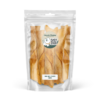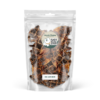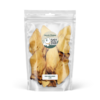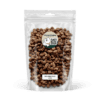Providing your furry friend with the right amount of food is a crucial aspect of ensuring their overall health and happiness. The perfect balance involves considering factors such as your dog’s weight, activity level, and even exploring unique protein sources like kangaroo meat. Here’s a guide to help you find that sweet spot in your dog’s diet.
Weight Watch:
Maintaining an ideal weight is essential for your dog’s well-being. Obesity in dogs can lead to a host of health issues, while an underweight pup may lack the energy needed for a vibrant life. Start by following the feeding guidelines on your chosen dog food’s packaging, which typically factor in your dog’s weight. Regularly weigh your dog and adjust their portions as needed to keep them in a healthy range. A simple touch can also help – you should be able to feel your dog’s ribs without applying too much pressure.
Active Lifestyle, Active Diet:
Your dog’s activity level is a significant player in the feeding equation. Highly active breeds or those regularly hitting the trails burn more calories and may need a higher daily caloric intake. On the flip side, less active dogs or seniors may require fewer calories to avoid packing on extra weight. Dividing the daily food portion into multiple meals not only aids digestion but also prevents overeating, promoting a healthier weight.
Kangaroo Meat: A Unique Protein Boost:
Exploring unconventional protein sources can be an exciting venture, and one option gaining traction is kangaroo meat. Known for its lean profile and rich nutritional content, kangaroo meat offers several benefits for your pup.
Low in Fat, High in Protein: Kangaroo meat is naturally low in fat and high in protein, making it an excellent choice for dogs prone to weight issues. The lean nature of kangaroo meat supports a healthy weight management strategy.
Rich in Essential Nutrients: Beyond protein, kangaroo meat packs a punch of essential nutrients like iron and zinc. These nutrients are vital for your dog’s overall health, contributing to everything from a shiny coat to a robust immune system.
Alternative for Allergies: Some dogs may have sensitivities or allergies to more common protein sources. Kangaroo meat serves as an alternative, potentially alleviating issues associated with food sensitivities.
Feeding Guidelines:
While these general guidelines can point you in the right direction, it’s crucial to monitor your dog’s response to any dietary changes. Every dog is unique, and what works for one may not suit another. If you notice positive changes in your dog’s weight, coat, and overall energy levels, you’re likely on the right track.
In conclusion, finding the perfect feeding balance for your dog involves a thoughtful consideration of their weight, activity level, and even exploring alternative protein sources like kangaroo meat. By tailoring their diet to these individual factors, you’re not just providing them with a meal – you’re contributing to their overall health and happiness.
Lorem ipsum dolor sit amet, consectetur adipiscing elit. Ut elit tellus, luctus nec ullamcorper mattis, pulvinar dapibus leo.






